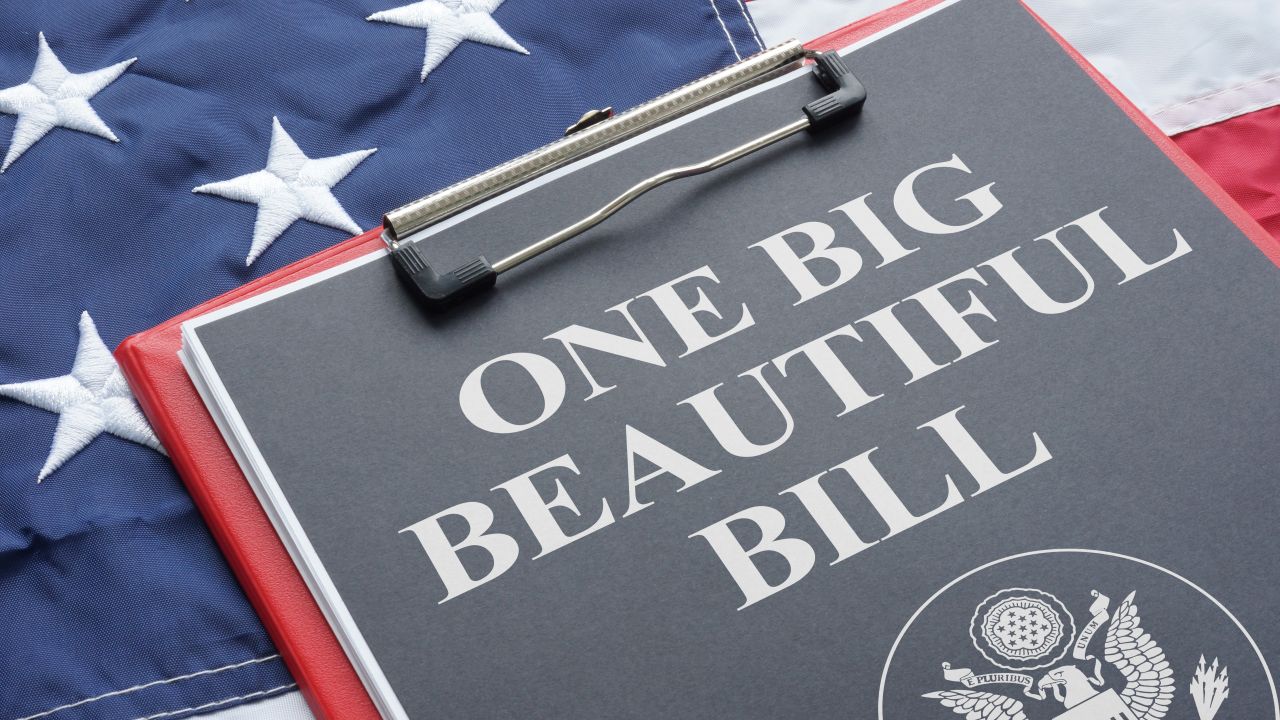TL;DR Summary: The “One Big Beautiful Bill Act” (OBBBA) is a financial reform package that could have far-reaching implications for your estate plan, especially for taxes, wealth transfer, and asset protection. Consult an experienced estate planning attorney to determine this bill’s impact on you and how you can best protect your estate.
If you’re navigating estate planning in California, there’s big news you need to know. Congress recently passed the One Big Beautiful Bill Act (also called the “OBBBA,” or Public Law 119-21) and it’s shaking up how charitable giving and wealth transfers will work starting in 2025 and 2026.
Whether you’re someone who gives modestly every year, a high-income donor making substantial gifts, or a family thinking about passing wealth to the next generation, these changes will affect how you plan. At Goff Legal, our experienced estate planning attorneys believe that estate planning doesn’t have to feel overwhelming or boring. So, let’s break this down simply and clearly.
Why the OBBBA Matters for California Estate Planning Clients
California has its own unique tax landscape, but federal law plays a huge role in estate planning strategy, especially when it comes to charitable giving, deductions, and wealth transfers.
The One Big Beautiful Bill Act (OBBBA) impacts:
- How much of your charitable giving you can deduct.
- How higher-income Californians plan their philanthropy.
- Which giving strategies work best for maximizing your tax benefits.
- How much you can give to loved ones during your lifetime without paying federal estate or gift taxes.
Let’s walk through the key updates one by one.
1. Big News for Non-Itemizers (Good for Most Californians)
Starting in 2026, taxpayers who don’t itemize deductions (which is most Californians) get a new tax perk for charitable giving:
- Up to $1,000 for single filers
- Up to $2,000 for joint filers
This applies only to cash gifts to public charities. Donations to donor-advised funds or private foundations don’t qualify.
Why This Matters
Historically, non-itemizers couldn’t deduct charitable contributions at all. For many Californians, this change unlocks a small but meaningful tax benefit for recurring giving.
Example:
If you file jointly and give $2,000 to your favorite charity in 2026, you can now deduct the entire $2,000, even without itemizing.
For clients who love making small, recurring donations to causes they care about, this is a win.
2. High-Income Donors: A New Cap on Donation Value
Here’s where it gets trickier. Beginning in 2026, high-income donors (meaning those in the top federal tax bracket of 37%) face a new deduction cap:
- Even if your bracket is 37%, your charitable deduction is capped at 35%.
Why It Matters
Under the old rules, a $1,000 gift might have saved you $370 in federal taxes. Under the OBBBA, you’ll save $350 instead.
That may not sound like much, but when you’re donating tens or hundreds of thousands of dollars, the impact adds up quickly.
Planning Tip
If you’re a high-income donor, consider making large charitable contributions in 2025 to maximize the full deduction before the cap kicks in.
3. New “Floor” on Charitable Deductions
For itemizers and corporations, the OBBBA introduces another twist:
Starting in 2026:
- Itemizing individuals: You can only deduct charitable donations that exceed 0.5% of your AGI. For example, if your AGI is $300,000, the first $1,500 of your donations doesn’t count. Only donations beyond $1,500 are deductible.
- Corporations: Your charitable deductions only apply to contributions over 1% of taxable income.
What This Means for Californians
This rule encourages larger, less frequent donations rather than smaller, ongoing gifts. For many clients, it will change the way they structure their annual giving.
Pro Tip: “Bunching” charitable donations (making several years’ worth of contributions in one year) can help you clear this new deduction threshold. Tools like donor-advised funds make this easier to manage.
4. Estate & Gift Tax Exemption: Still a Star
Here’s some good news for families thinking about passing on wealth. The OBBBA leaves intact one of the most powerful estate planning tools:
- The federal estate and gift tax exemption rises to $15 million per person in 2026.
- This amount will continue to be adjusted for inflation going forward.
Why It Matters
This exemption allows you to transfer significant assets tax-free, either during your lifetime or at death. For California families with high-value real estate, investment portfolios, or business interests, this provides powerful planning opportunities.
At Goff Legal, we often combine this exemption with lifetime gifting strategies to help families minimize future tax burdens and ensure a smooth transfer of wealth.
5. Should You Accelerate Gifts in 2025? Probably.
With so many OBBBA changes kicking in by 2026, 2025 is shaping up to be a critical year for planning. Here’s why:
- Non-itemizers: Waiting until 2026 gives you access to the new charitable deduction.
- Itemizers in higher brackets: Gifting before 2026 lets you maximize deductions before the 35% cap and AGI floor take effect.
- Bundling strategies: Making several years’ worth of gifts in one year can help you optimize deductions and meet new thresholds efficiently.
Planning Tools to Consider
- Donor-Advised Funds (DAFs) – Contribute now, claim the deduction today, and decide later which charities receive the funds.
- Bunching Contributions – Combine multiple years’ donations into a single tax year to surpass the 0.5% AGI floor.
- Lifetime Gifting – Use the $15 million exemption strategically to reduce your taxable estate.
What This Means for California Estate Planning Clients
Let’s summarize what these changes mean for you:
Expanded Access to Deductions
More Californians (especially non-itemizers) get a tax break for modest charitable giving starting in 2026.
Timing Is Everything
High-income donors and itemizers should consider accelerating substantial gifts before 2026 to take advantage of the higher deduction rates.
Leverage the Permanent Exemption
With the estate and gift tax exemption locked at $15 million per person, lifetime giving remains one of the most powerful wealth transfer strategies.
Strategic Planning Required
- For itemizers: Use bunching strategies and donor-advised funds to maximize your tax benefits.
- For non-itemizers: Plan for recurring cash gifts starting in 2026 to benefit from the new deductions.
How Goff Legal Helps You Stay Ahead
The One Big Beautiful Bill Act represents one of the most significant shifts in charitable giving and wealth transfer planning in years. But you don’t have to figure this out alone.
At Goff Legal, we:
- Analyze how OBBBA impacts your current estate plan.
- Review your lifetime giving and estate tax exemptions to see if your plan needs to be modified.
- Partner with your financial advisors and CPAs to coordinate the best approach so they can help you create personalized charitable giving strategies that maximize deductions.
- And help you leverage lifetime gifting tools to transfer wealth efficiently.
Ready to Update Your Estate Plan?
If you have a charitable heart, a growing estate, or both, these changes matter to you. The window between now and 2026 is a critical time to maximize your tax benefits and ensure your wealth transfers exactly as you intend.
At Goff Legal, our experienced estate planning attorneys make estate planning approachable, understandable, and customized to your goals. Schedule your free discovery call today and let’s make sure your estate plan is ready for the future.
FAQs:
Will the OBBBA affect state estate taxes or just federal?
While the BBB primarily focuses on federal tax laws, some states may adjust their estate or inheritance tax rules in response. It’s important to review your estate plan with an attorney familiar with both federal and California-specific estate tax regulations.
Could the OBBBA change how retirement accounts are taxed when passed to heirs?
Yes, there are discussions in the bill that could modify how inherited retirement accounts, like IRAs and 401(k)s, are taxed. Changes might impact required minimum distributions and tax timing, which could affect estate planning strategies.
Will life insurance policies be impacted by the OBBBA?
Life insurance proceeds are generally tax-free, but certain proposals in the OBBBA could impact estate inclusion rules, potentially affecting how large policies are counted toward your estate for tax purposes.
How might the bill affect non-citizen or non-resident heirs?
No, the OBBBA rules do not make any significant reporting or tax requirements for heirs who are not U.S. citizens or residents. However, planning for these beneficiaries still requires special strategies to minimize tax exposure as it did before the bill passed.
What steps should I take now that the OBBBA has passed?
Now that the bill is law, it’s essential to review your estate plan immediately. Strategies like updating trusts, re-evaluating gifting plans, and adjusting retirement account designations can help you minimize taxes and protect your wealth under the new rules.
Do I need an estate plan now that the OBBBA has passed?
Yes. Estate planning covers more than just federal estate taxes. California has much lower limits for probate ($208,850 for personal property and up to $750,000 for a primary residence). Meeting with an attorney can help you avoid both issues at your death.
Goff Legal, PC is a woman-owned boutique California law firm dedicated to guiding clients through the complexities of Estate Planning, Trust Administration, and Probate. Led by attorney Alexandria “Ali” Goff, we provide personalized legal services designed to protect families, preserve legacies, and bring peace of mind.
Written by Goff Legal, PC

